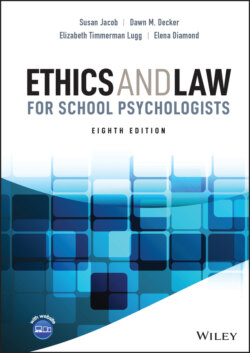Читать книгу Ethics and Law for School Psychologists - Susan Jacob - Страница 62
Chapter 2 LAW AND SCHOOL PSYCHOLOGY: AN INTRODUCTION
ОглавлениеAs noted in Chapter 1, codes of ethics are one source of quality control in the provision of school psychological services. This chapter explores two other mechanisms of quality assurance: public school law and the credentialing of school psychologists. We also further explore the legal implications of school-based practice. In this book, the term school-based practice means that the school psychologist is an employee of the schools, whether full-time, part-time, or on a per-case or consultative basis. In contrast, the term private practice refers to situations in which a school psychologist enters into an agreement with a client rather than an educational agency to provide services, and the fee for services is the responsibility of the client or their representative (NASP, 2020, Definition of Terms As Used in the Principles for Professional Ethics, p. 41).
In this chapter, the reader will learn that in the United States, state governments, rather than the federal government, have assumed the duty to educate children and the power to do so. This authority to educate children and ensure student safety is further delegated by state governments to school boards. When principals, teachers, and school psychologists employed by a school board make decisions in their official roles, such acts are seen as an extension of the authority of state government; in legal parlance, school-based practitioners are considered to be state actors (Russo, 2018; Wells, 2004).
In our discussions with school psychologists, we have found that the subtle but important differences between school-based practice and private practice (or employment in other nonschool settings) often are misunderstood. Under the U.S. Constitution and federal and state statutory law, students and their parents have many legal rights in our public schools. School-based practitioners, as state actors, must know and respect those legal rights. Furthermore, as employees of a school board, school-based practitioners have a legal obligation to protect all students from reasonably foreseeable risk of harm. This duty extends to all students, not just clients (Russo, 2018).
